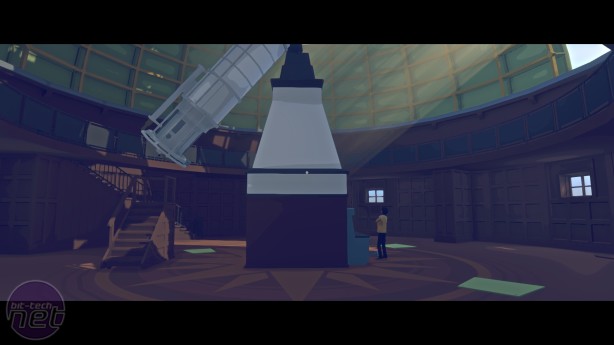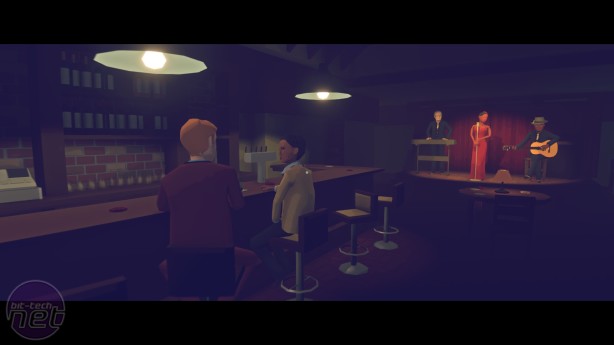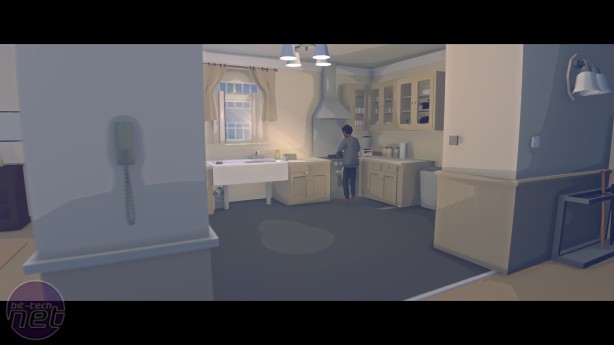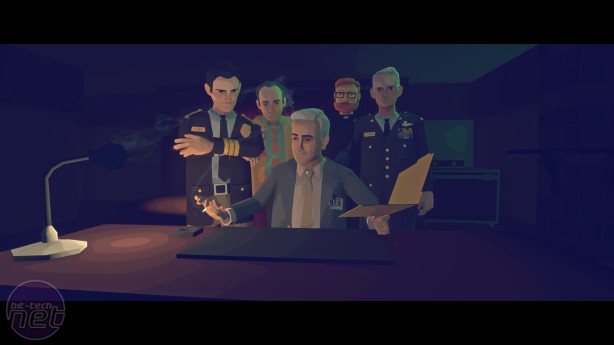
And the first fifteen minutes of Virginia are enjoyable enough, while the novelty of deciphering the silent storytelling and the nippy pace of the story still hold. But it wasn't long before I became frustrated by the fact I wasn't able to do much of anything in the game. Interacting with Virginia is almost entirely restricted to moving around the environments and clicking on an extremely limited number of objects to move the story forward. And there are quite a lot of scenes in which you can't move at all. Virginia appears to view player interaction with outright contempt.
Honestly, I don't get it. Much as I dislike the insinuation that walking sims like Dear Esther or The Vanishing of Ethan Carter aren't games, in this case I'm really struggling to understand why Virginia is one and what it offers as a game that it couldn't have done just as well or perhaps better as a film or TV show. It doesn't let you explore environments at your own pace, it doesn't let you investigate much of anything. Virginia only offers the merest nod toward any player agency whatsoever.
I could forgive Virginia this hardline railroading if the storytelling justified it. But it doesn't. It's alright, but hardly anything we haven't witnessed before in detective fiction. Moreover, I don't think the lack of dialogue works so well in conjunction with the speedy editing. I ended up missing or misinterpreting a lot of things. For example, at the start I thought it was my own character who was being subjected to an internal investigation, because I wasn't given long enough to read the file handed to Tarver by the director. It was only later that I realised I was being assigned the investigation, rather than being given notice of it.
And this happened while the plot is fairly straightforward. Later on it becomes all kinds of convoluted, with reality intertwining with dreams, nightmares, visions and premonitions, at which point I lost the thread almost completely. The story of the missing boy also becomes lost amid the focus on Halperin's internal investigation, which is unfortunate as I found it to be the more intriguing tale.
But what I really don't understand about Virginia is this. Throughout its length Virginia rides Twin Peaks' coattails harder than a grand national jockey. It's evident in the blending of small-town soap-opera with Gothic surrealism, the recurring themes such as the buffalo, the red bird, the diner, the amulet. There's even a chapter titled 'Roadhouse' in which you sit down for drinks while a band plays a number so powerfully reminiscent of 'The Nightingale' I was expecting Angelo Badalamenti to rock up on stage and take a bow.
But amidst all this it forgets what makes Twin Peaks such a beloved series. It's a show so rich in character and detail that it almost makes you feel like you're actually there. Over the course of the two series and about thirty hours of TV, it gradually immerses you in its locations, and you come to know its inhabitants with remarkable intimacy. It's such a vivid and palpable place that you can really imagine yourself sitting in the Double R Diner and ordering a black coffee and cherry pie, or ordering a drink at the Roadhouse, or shooting the shit with Dale and Harry as they wander the woods while following a lead. You can really see how Dale becomes infatuated with the place, despite the strange and terrible things that happen there.
Virginia doesn't do this. It never allows us the time to become acquainted with the town of Kingdom or its inhabitants. We've no sooner adjusted to a new location than the plot moves on to another. Aside from Halperin, we never get the opportunity to learn about or care about any of the characters. The imagery which becomes iconic in Twin Peaks, like the diner, is entirely inconsequential here because we don't get to spend time with it. Again, this isn't about Virginia not being what I expected. Any game that relies on Twin Peaks so heavily to conjure its sense of place needs to then immerse you in that place. It doesn't have to be a grand open world affair or have visuals like Uncharted to do this. It just needs to take the time to make the player want to be there. If you want an example of a game that does this well, look no further than Dontnod's Life is Strange.
By the end of Virginia, Kingdom wasn't a place that I wanted to stay in. Kingdom was a place that I barely even knew. It's such a shame, because the developers are clearly a bunch of talented folk, and if nothing else you should check out the soundtrack because it's absolutely stellar. But the soundtrack is really all I can recommend Virginia for, because otherwise, I haven't played a game this wrong-headed for quite some time.
Honestly, I don't get it. Much as I dislike the insinuation that walking sims like Dear Esther or The Vanishing of Ethan Carter aren't games, in this case I'm really struggling to understand why Virginia is one and what it offers as a game that it couldn't have done just as well or perhaps better as a film or TV show. It doesn't let you explore environments at your own pace, it doesn't let you investigate much of anything. Virginia only offers the merest nod toward any player agency whatsoever.
I could forgive Virginia this hardline railroading if the storytelling justified it. But it doesn't. It's alright, but hardly anything we haven't witnessed before in detective fiction. Moreover, I don't think the lack of dialogue works so well in conjunction with the speedy editing. I ended up missing or misinterpreting a lot of things. For example, at the start I thought it was my own character who was being subjected to an internal investigation, because I wasn't given long enough to read the file handed to Tarver by the director. It was only later that I realised I was being assigned the investigation, rather than being given notice of it.
And this happened while the plot is fairly straightforward. Later on it becomes all kinds of convoluted, with reality intertwining with dreams, nightmares, visions and premonitions, at which point I lost the thread almost completely. The story of the missing boy also becomes lost amid the focus on Halperin's internal investigation, which is unfortunate as I found it to be the more intriguing tale.
But what I really don't understand about Virginia is this. Throughout its length Virginia rides Twin Peaks' coattails harder than a grand national jockey. It's evident in the blending of small-town soap-opera with Gothic surrealism, the recurring themes such as the buffalo, the red bird, the diner, the amulet. There's even a chapter titled 'Roadhouse' in which you sit down for drinks while a band plays a number so powerfully reminiscent of 'The Nightingale' I was expecting Angelo Badalamenti to rock up on stage and take a bow.
But amidst all this it forgets what makes Twin Peaks such a beloved series. It's a show so rich in character and detail that it almost makes you feel like you're actually there. Over the course of the two series and about thirty hours of TV, it gradually immerses you in its locations, and you come to know its inhabitants with remarkable intimacy. It's such a vivid and palpable place that you can really imagine yourself sitting in the Double R Diner and ordering a black coffee and cherry pie, or ordering a drink at the Roadhouse, or shooting the shit with Dale and Harry as they wander the woods while following a lead. You can really see how Dale becomes infatuated with the place, despite the strange and terrible things that happen there.
Virginia doesn't do this. It never allows us the time to become acquainted with the town of Kingdom or its inhabitants. We've no sooner adjusted to a new location than the plot moves on to another. Aside from Halperin, we never get the opportunity to learn about or care about any of the characters. The imagery which becomes iconic in Twin Peaks, like the diner, is entirely inconsequential here because we don't get to spend time with it. Again, this isn't about Virginia not being what I expected. Any game that relies on Twin Peaks so heavily to conjure its sense of place needs to then immerse you in that place. It doesn't have to be a grand open world affair or have visuals like Uncharted to do this. It just needs to take the time to make the player want to be there. If you want an example of a game that does this well, look no further than Dontnod's Life is Strange.
By the end of Virginia, Kingdom wasn't a place that I wanted to stay in. Kingdom was a place that I barely even knew. It's such a shame, because the developers are clearly a bunch of talented folk, and if nothing else you should check out the soundtrack because it's absolutely stellar. But the soundtrack is really all I can recommend Virginia for, because otherwise, I haven't played a game this wrong-headed for quite some time.

MSI MPG Velox 100R Chassis Review
October 14 2021 | 15:04













Want to comment? Please log in.